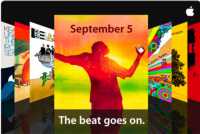Will the rumor machine ruin Apple's iPod surprise?

The clamor of rumors keeps growing about Apple's "beat goes on" event set for Wednesday morning in San Francisco. But could there be a let-down if the company just shows cool, new iPods?
As is the case with any Apple introduction, there's a great amount of speculation surrounding what will be released. There's almost a certainty for new lines of video iPods and nano-style audio players.

Yet, sometimes the expectation of these rumored pieces of hardware take on a life of their own. Apple ends up being judged for "missing" the release of an rumored product.
I remember this happening back some 10 years ago. I believe it was a Monday or Tuesday introduction in November, 1997, held on the De Anza Community College campus near the Apple headquarters.
My recollection is that the expectation was soaring back then for some new telephony-enabled handheld or tablet computer. This was what the press came to Cupertino to hear.
Now, MacWEEK ran a different story: our sources said Apple would release its first PowerPC G3 systems, code-named Gossamer, as well as the first PowerBook G3 machine, the PowerBook G3/250, called Kanga. I wrote the prediction in a front page article in the November 3, 1997, issue.
In the auditorium, I sat next to a young woman reporter from Newsweek magazine. When Steve Jobs finished his presentation, she said out loud that this event had been a "big waste of time." According to her, Apple had failed by not introducing the handheld (or whatever it was, I'm shaky on these ancient rumors). She was fuming.
I turned to her and asked her a few questions. First off, I wondered why she had put so much stock on this rumor to begin with?
While I had been prepared to be wrong, the rumors had all seemed far-fetched to me. There was no confirmation.
Besides, the first PPC G3 machines were big news to the Mac installed base. Of course, this reporter didn't care about that — switchers were a think-different dream back in those days.
Besides, I aksed, how could the missing, rumored device be considered a "failure?" Wasn't the failure here, after all, more about her reporting?
I suggested that any system vendor should make news by bringing to the market (what was then) the fastest notebook computer on the planet. Wasn't that something worthy of reporting, even though it was from Apple, and cost $5,699, and weighed almost 8 pounds?
In addition, I pointed out Apple's new channel strategy, and the introduction of mini-stores within CompUSA, were also important new tacks for the company and Mac users. In the stores, Apple would hire and train its own group of sales reps. And Mac users would find sales support for Mac products.
Apple had tested this concept in Australia first in the mid-1990s and then developed the plan further on the mainland. The success of this project lead directly to the Apple stores, which are a great marketing success story. These CompUSA mini-stores still exist and the concept was expanded to Best Buy stores.
That day in 1997 also featured the introduction of Apple's WebObjects-powered online store. It was almost a footnote in the story. That too has been a huge hit.
In hindsight, there weren't so many failures that day.